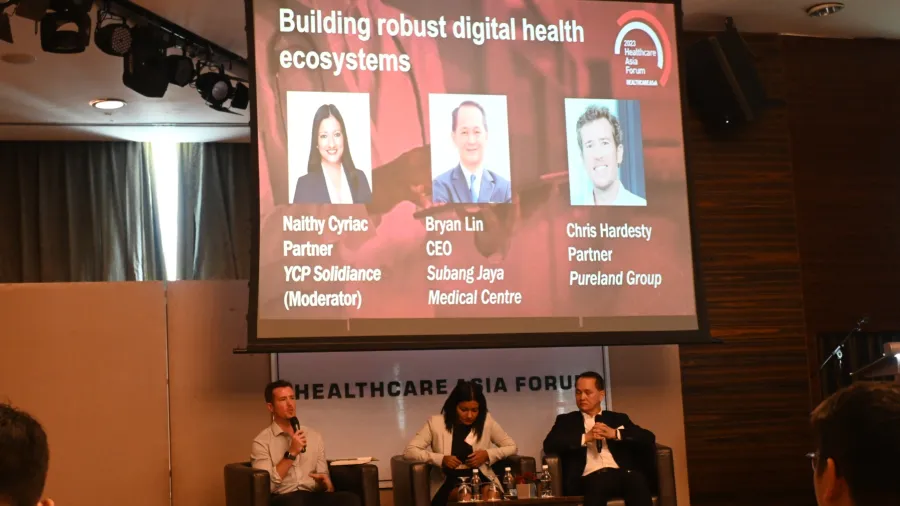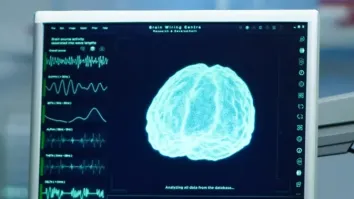
What’s slowing down the health tech startup ecosystem?
Experts reveal data collection and support from clinicians are some of the hurdles to accelerating health tech startups’ adoption.
Amidst the rising venture funding on digital health deals in Asia Pacific in 2021, healthcare startups need help in implementing their services to customers. A 2021 Galen Growth report showed that digital health deals in APAC grew 11.2% from the previous year.
At one of the panel sessions at the 2023 Healthcare Asia Forum in Kuala Lumpur, healthcare experts talked about building robust digital health ecosystems.
YCP Solidiance Partner Naithy Cyriac, who led the discussion, asked Chris Hardesty, partner at private investment group, Pureland Group, about success stories of health tech case studies that have been beneficial to patients or customers.
Hardesty first discussed some of the major hurdles that digital health startups face which include time, data collection, and health system regulators. He said it is difficult to get time from clinical members to support the innovation.
“I’ve noticed the big trends and improvements recently, and that’s through a lot of government, and even private secretary programs to encourage innovation. It doesn’t have to be ‘the clinician craves the startup,’ but they can at least get hands-on and get feedback from the startup and maybe try and work with them. So that’s hugely helpful, right?” he told over 60 attendees at the Malaysia forum.
On the challenge for health system regulators, Hardesty said there are now regulatory sandboxes that encourage startups to collect data.
In terms of success stories, Hardesty cited innovators of remote patient monitoring, which allows patients to recover in their homes. One example is a sensor that analyses breathing situations, which could help detect respiratory diseases. Children with respiratory issues can wear this tiny sensor.
“Ultimately, this only took off when we got permission, and got key opinion leaders to look at this technology and say, ‘You know what, this is a huge disruption into my business practice today,’” said Hardesty.
Speaking of data, Subang Jaya Medical Centre CEO Bryan Lin disclosed that a hospital gathers plenty of data about patient journeys such as admission, discharge, laboratory results, body measurements, and more.
This makes it a crucial part of the hospital industry and mining patient data should be studied so that it becomes more cohesive in analysis, Lin said.
Lack of animal health
Although there have been a lot of discussions on human health, Hardesty aired his concern about the lack of talk on animal health.
He shared that they recently invested in technology that looks into biometric monitoring of animals.
“This one has been rolled out through veterinary clinics and other veterinary and industrial farm care practices. But again, success was achieved by working through these non-traditional partnerships,” he said.
Personalised health experience
During the panel session, Cyriac also asked Lin about his thoughts on getting rid of the human touch element amidst the rise of digital healthcare.
In response, Lin said much of digital health is very personalised and that there was no surprise that there is a transition to a much more digitalised healthcare system.
He also noted the easy availability of cutting-edge tech which improved customisation of telemedicine services.
“This is just the beginning of virtual care. Such technologies extend beyond the hospital's walls and geographical boundaries,” said Lin.
“However, because it is not a silver bullet that fits all, we must consider market segments such as those who are healthy, those with chronic diseases, the elderly who may be living away from their children, and those who require supervision in acute care, such as Intensive Care Unit (ICU) patients,” Lin said.
When asked about examples of robust healthcare systems, Lin touted the capabilities of their hospital, such as being the leading cancer centre in Malaysia.
Subang Jaya Medical Centre offers new cancer treatments such as the TruBeam radiotherapy system and treatment from world-leading cancer doctors. Oncology services include private chemotherapy treatment, radiation therapy, bone marrow transplantation, and a range of cancer surgeries.
In closing the discussion, Lin encouraged partnerships to create innovation breakthroughs in the healthcare system.



















 Advertise
Advertise






